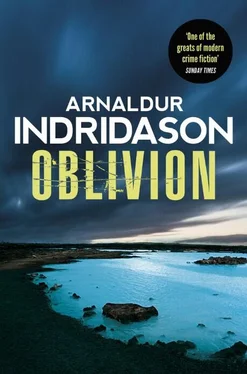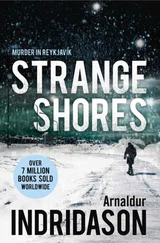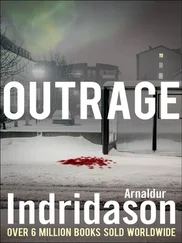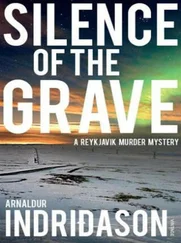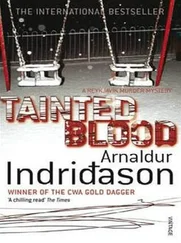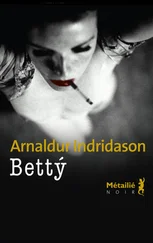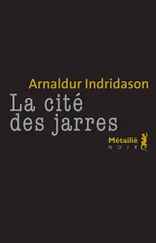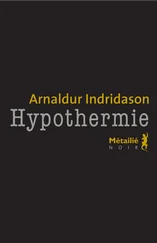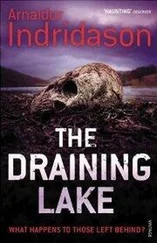‘I haven’t got time for this,’ Erlendur heard him mutter, then add, on a low, pleading note, as the door closed: ‘Please, just go away and don’t ever come back.’
Some time later Erlendur stood on the pavement by a high wooden fence, looking into a playground and watching people coming to collect their children. Grandmothers in overcoats and headscarves, with handbags on their arms. Mothers in anoraks and peasant blouses. They lingered, maybe smoked a cigarette. There was the odd father too. Some of the children were playing with teenage helpers who joined them in the sandpit, on the swings or see-saw, aware that soon it would be closing time and they would be free to go home. He heard the sound of the mothers’ voices, the shrieking of the children, and watched the woman in charge comforting a little girl who had hurt herself falling off the see-saw. The woman dusted the dirt from her red waterproof trousers and told her she was all right, then took her to the sandpit and encouraged her to play with the children who were building a sandcastle there. The little girl, who was five years old, instantly forgot her woes and started patting sand into a green plastic bucket. He saw that the woman in charge was keeping an eye on her as if she didn’t want the girl to be left out. Erlendur had noticed that she had a tendency to wander about on her own.
He watched her pottering about in the sandpit for a while, then turned away and walked off with a heavy heart. He knew the little girl well but thought she was probably starting to forget him. He had only himself to blame. One day he hoped they could be friends, so he wouldn’t have to watch her from afar, like some kind of outcast. Every so often he stopped by, like now, but didn’t talk to anyone, especially not to the little girl, because he didn’t want to cause any trouble. Nor did he hang around long, for fear people would mistake him for some kind of pervert.
Erlendur hunched his shoulders against the cold and headed back to his car, thinking about the little girl and himself and what a mess he had made of things. One day he hoped he would have a chance to explain to his daughter who he was and why he’d had to leave.
When Erlendur returned to the office in Kópavogur, he was informed that Marion wanted to see him. Marion was still ill in bed, and Erlendur had to get directions to the house since he hadn’t been there before. It was unusual for people to be invited round. At least, this was the first time Erlendur had heard of it and he didn’t know what to expect. He had always had the sense that, like him, Marion preferred to keep private life and work separate.
It was nearing supper time and Erlendur was starving since he hadn’t eaten lunch, so before heading over to Marion’s he swung by Skúlakaffi and bought a takeaway of salted lamb with potatoes and swedes. He was back in his car before it occurred to him that Marion might like something to eat too, so he returned and ordered a sandwich in a box. This offering seemed to meet with approval.
‘Thank you, you shouldn’t have,’ said Marion, accepting the box.
‘I thought you might like something to eat,’ said Erlendur. ‘The only sandwiches they had were prawn.’ He glanced around the flat and noticed an open bottle of port on the table. ‘Feeling any better?’
‘Getting there.’
As was evident from the bookshelves, Marion was an insatiable reader. Every wall was lined with books, from large foreign reference works in many volumes to slender collections of Icelandic verse that marked themselves out here and there by their tatty paper spines. Icelandic sagas rubbed shoulders with love stories; Icelandic folklore mingled with foreign biographies and translated detective stories, works on natural history and every kind of art form, from ballet to baroque music. Everything was neatly ordered on the shelves, the perfectly even rows a pleasure to the eye, testimony to the fact that Marion had once worked at the City Library. The overall effect was only enhanced by the myriad small figurines arranged in front of the books, some made of delicate painted porcelain, others of cruder pottery or carved wood, resulting in the most varied collection. Marion noticed Erlendur’s gaze pause on these knick-knacks.
‘An old friend of mine, a woman who used to travel at lot, sent me those ornaments over many years,’ said Marion. ‘No two are alike or come from the same place.’
‘Used to? Has she given up now?’
‘I got a letter the day before yesterday informing me that she was dead,’ said Marion. ‘It came as quite a shock. I... I wasn’t expecting it.’
‘I see,’ said Erlendur. ‘You can’t have felt like coming into work.’
His eyes fell on the photograph of an older man in a black suit, which stood on a table. Beside it burned a candle in a small holder made of lava.
‘A friend of mine,’ said Marion. ‘He rejoiced in the unusual name of Athanasius. Died years ago. Did you see Caroline? I hear you’ve been out to the base.’
Erlendur nodded and put Marion in the picture about his meeting with Caroline, the cocktail waitress Joan and her relationship with Kristvin, and the fact that Kristvin had in all likelihood been with her the evening he fell to his death. He wouldn’t have been able to use the Corolla, so would have had to walk and might conceivably have been attacked by the same individuals who had sabotaged his car. Erlendur admitted that he and Caroline had had a difference of opinion about the presence of the army and that he wasn’t sure she would offer them any further help.
‘It was clever of her to find that woman, that Joan, so quickly,’ said Marion. ‘She’s done us a good turn. We should try and keep her happy. Try not to quarrel with her unnecessarily.’
‘Of course. I did try not to, but she’s got quite a temper on her and knows her own mind. I’m hoping she’s going to check a name for us — the man Joan mentioned, who was at the Animal Locker with Kristvin. Well, I say “name” — Kristvin referred to him as “W”.’
‘Dubya?’
‘That’s all we’ve got,’ said Erlendur. ‘Caroline said it wasn’t much to go on, but the odds are that he’s a member of the Defense Force, or at least associated with it.’
‘And Joan’s husband wasn’t in the country?’
‘So she claims. Caroline was going to check up on that too. His name’s Earl Jones, and if Joan’s to be believed, he doesn’t pay her much attention. She’s pretty outspoken.’
‘Like a lot of Americans,’ said Marion.
‘Probably a racist too, judging by the way she went for Caroline,’ said Erlendur.
‘Oh?’
‘They almost came to blows. Joan thought she was talking down to her.’
‘Caroline must have had her hands full with you two,’ said Marion. ‘I feel quite sorry for her.’
‘Hmm. So, do you reckon Kristvin was already being watched on the base? That people were aware of his movements? Knew about Joan?’
‘I’ve been thinking about what that freak Rúdólf told us. What if Kristvin had uncovered evidence relating to arms shipments in that hangar? Something earth-shattering that would really cause a stir if it leaked out. What if he drew attention to himself by asking questions? Could information about the shipments be so sensitive that they’d actually be prepared to kill Kristvin to shut him up?’
‘It’s like a whole different country out there on Midnesheidi,’ said Erlendur. ‘What do we know about how they do things? Look at Vietnam. Or Watergate. What are we supposed to think?’
‘Do you drink port, by the way? It’s all I have,’ said Marion, pouring another glass.
‘No, thanks.’
‘They put a man on the moon,’ Marion pointed out.
Читать дальше
